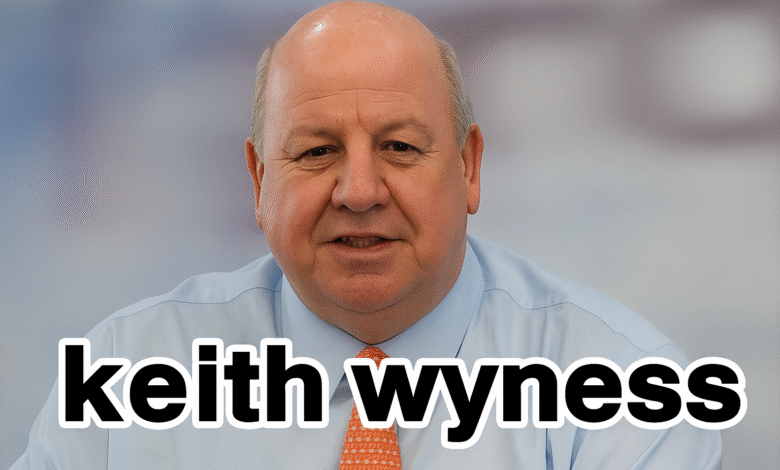Keith Wyness: The Visionary and the Controversialist of Football Management

Introduction
Keith Wyness is a name that resonates deeply within British football management — a figure admired for his bold strategies and criticised for his confrontational leadership style. As a Scottish businessman and football executive, Wyness’ career journey from British Airways to the boardrooms of major football clubs like Aberdeen, Everton, and Aston Villa reflects a rare blend of corporate insight and sporting passion. His life demonstrates both the brilliance and the burden of leadership in an industry driven by finance, fan loyalty, and fierce competition.
His story stands as a reminder that success in sports management demands not just knowledge of the game, but mastery of negotiation, resilience under pressure, and a willingness to make unpopular decisions when necessary.
Quick Bio
| Attribute | Details |
|---|---|
| Full Name | Keith Wyness |
| Date of Birth | 26 October 1956 |
| Birthplace | Aberdeen, Scotland |
| Nationality | British (Scottish) |
| Education | University of Nottingham |
| Occupation | Football Executive, Consultant |
| Clubs Managed | Aberdeen FC, Everton FC, Aston Villa FC |
| Known For | Strategic Football Administration and Commercial Reforms |
| Net Worth (Approx.) | Estimated around £5–10 million |
| Current Role | Football Business Consultant and Media Contributor |
Early Life and Education
Born in Aberdeen, Scotland, Keith Wyness grew up in a culture defined by discipline and ambition. His early years reflected an interest in both communication and leadership, which later shaped his management style. He attended the University of Nottingham, where his sharp intellect earned him a place on the university’s University Challenge quiz team — a small but telling sign of his analytical mindset and competitiveness.
After completing his education, Wyness began his professional journey not in sports, but in the aviation industry. His early exposure to corporate leadership would later become the foundation of his football management philosophy.
Corporate Career at British Airways
Keith Wyness joined British Airways through its graduate program and quickly rose through the ranks. He worked in marketing, press relations, and executive roles — eventually becoming one of the airline’s youngest vice presidents. Wyness contributed to several landmark projects, including the marketing of the Concorde and the development of the Executive Club frequent-flyer program.
This early corporate success shaped his future approach to football — he viewed clubs as global brands rather than just sporting teams. His ability to merge business logic with sporting emotion made him a unique figure in football administration.
Transition to Football Management
By the early 2000s, Wyness decided to enter the football world, bringing with him decades of commercial experience. His transition from aviation to sports was bold, but it marked the beginning of an influential — and often controversial — era in club management.
Aberdeen FC: The Foundation of a Reformer
In 2000, Wyness became the Chief Executive of Aberdeen Football Club, where he faced the challenge of turning around a financially struggling team. He implemented new commercial strategies, introduced performance-based contracts, and worked to stabilise the club’s revenue streams.
Under his leadership, Aberdeen improved its operational efficiency and reduced losses, laying a sustainable financial foundation for future growth. Wyness’ innovative player contract model, which tied wages to club performance and merchandise sales, was considered revolutionary at the time.
Everton FC: Building a Modern Football Enterprise
In 2004, Keith Wyness was appointed Chief Executive of Everton FC, marking the most high-profile phase of his career. During his five-year tenure, Everton transformed from a mid-table club into a top-four Premier League contender. Wyness worked closely with then-manager David Moyes to combine financial discipline with sporting ambition.
He introduced modern commercial structures, including the outsourcing of merchandising and retail operations, and spearheaded the construction of Finch Farm, a state-of-the-art training facility. While some fans criticised his cost-control policies, many recognised his role in making Everton financially stable and competitive on the pitch.
Aston Villa FC: Leadership Amid Chaos
In June 2016, Wyness took charge as Chief Executive of Aston Villa FC under owner Dr Tony Xia. His leadership came during a turbulent period, as the club faced ownership and financial instability following relegation from the Premier League.
Wyness worked tirelessly to restore order, improve governance, and attract investors. However, tensions with ownership escalated, and he was suspended in 2018 during a financial crisis that saw the club on the brink of administration. Despite the controversy, Wyness later won an unfair dismissal claim, with the club acknowledging that he had acted in its best interests.
Business Ventures and Consultancy
Following his executive roles, Keith Wyness launched his own consultancy business, Individual Strategies Ltd, providing advisory services to clubs and organisations seeking financial restructuring and governance reform.
He also became a respected football analyst and commentator, sharing insights on topics such as club ownership models, fan engagement, and financial fair play. His commentaries, particularly on Football Insider, are widely read for their honesty and insider perspective.
Leadership Style and Reputation
Keith Wyness is known for his assertive leadership and data-driven decision-making. Supporters describe him as a visionary who brought business intelligence into football, while critics label him as overly corporate and at times detached from fan sentiment.
His career reveals a dual legacy — one of innovation and integrity, but also conflict and controversy. Wyness himself often acknowledged that modern football executives walk a thin line between financial prudence and fan expectation.
Legacy and Influence
Keith Wyness’ legacy in football administration is complex yet undeniably impactful. He played a vital role in bridging the gap between corporate management and sports governance, proving that strategic vision can coexist with football passion.
His work at Everton and Aberdeen, in particular, left lasting structures that benefited the clubs long after his departure. Today, as a consultant and analyst, he continues to shape public and professional discussions about football’s economic future. His career remains a case study in leadership — both admired and criticised — that defines modern sports management.
Conclusion
Keith Wyness stands as one of the most distinctive football executives in Britain — a man whose strategic mind, corporate discipline, and fearless decision-making reshaped clubs and challenged traditions. Though his career has seen its share of controversy, it also reflects courage, resilience, and an unrelenting belief in professionalism.
His journey from the boardrooms of British Airways to the stadium offices of Everton and Aston Villa exemplifies the evolving nature of football — where passion meets profit, and leadership requires both vision and conviction.
FAQs
1. Who is Keith Wyness?
Keith Wyness is a Scottish businessman and football executive known for his leadership at Aberdeen, Everton, and Aston Villa Football Clubs.
2. What is Keith Wyness famous for?
He is recognised for introducing modern business strategies into football management, including performance-based contracts and infrastructure development.
3. What is Keith Wyness’ current occupation?
He currently works as a football consultant and media commentator, frequently contributing to discussions on club management and governance.
4. What are some of Keith Wyness’ major achievements?
Notable achievements include developing Finch Farm at Everton, improving Aberdeen’s finances, and promoting professional transparency in football operations.
5. What is Keith Wyness’ leadership style?
His style is analytical, strategic, and assertive — focusing on long-term sustainability, though occasionally criticised as overly corporate.
6. How has Keith Wyness impacted football today?
His influence persists through his consultancy work and public analysis, shaping conversations about financial fair play and responsible football governance.



